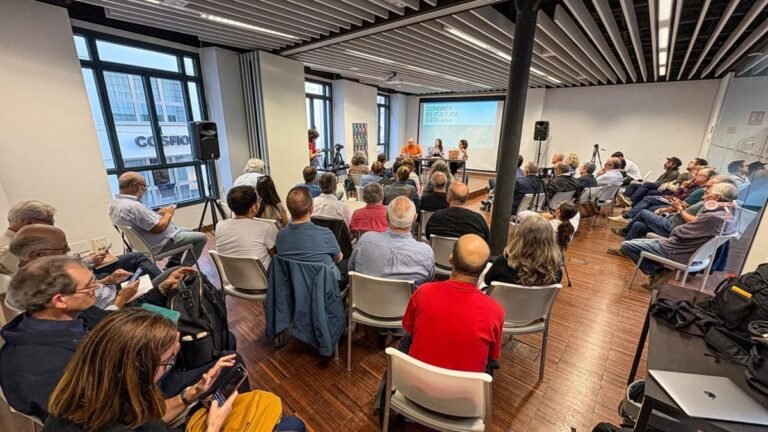
• According to the Councilor of Urbanism, «the tensioned area model has been a total failure wherever it has been applied.»
• The agreement highlights «significant progress in protecting the rights of property owners and streamlining judicial procedures,» and ensures that it «contributes to a more effective response to illegal occupation of housing.»
• The council has also agreed to request Valencia CF to provide monthly certifications of the Nou Mestalla project to ensure compliance with established deadlines.
• During the plenary session, the governance model for tourism «based on data and involving sector actors and innovation» was supported.
The City Council has endorsed the Plan + Housing this Tuesday, the municipality’s tool to «increase the supply and public housing stock» in the city, as highlighted by the Councilor of Urbanism, Juan Giner. The plenary agreement was approved with the votes of political groups from the municipal government, PP and Vox, as well as the Councilor of Entrepreneurship, Cecilia Herrero, and the non-attached councilor, Juanma Badenas. The PSPV and Compromís groups voted against.
Giner’s motion was voted as an alternative to the one initially proposed by socialist councilor Elisa Valía, which called for the declaration of Valencia «as a tensioned area to limit rental prices.» The approved agreement emphasizes the municipality’s commitment to «continue promoting the Plan + Housing» and expresses the corporation’s support for the amendment of the Criminal Procedure Law approved by the Congress of Deputies in November 2024 «allowing for fast-track trials of home invasion and occupation offenses.» Giner’s motion, which was approved, highlights this measure as «a significant advancement in protecting property rights and streamlining judicial procedures, contributing to a more effective response to illegal housing occupation.»
The agreement also expresses «rejection of the counter-reform proposed by the parliamentary groups of PSOE, Sumar, ERC, Bildu, and Podemos, which involves excluding home invasion and occupation offenses from fast-track procedures again.»
The issue sparked a wide debate in the Municipal Chamber. Socialist councilor Elisa Valía urged the local government to «take a stand on the housing situation in the city marked by housing emergency.» «Governing is taking a stand,» argued the councilor, «and in the housing sector, there is a clash of interests with a completely unbridled market and rampant inflation.» Therefore, Elisa Valía urged the corporation to «choose between two different models: defending the interests of families or defending the interests of developers and real estate speculators.»
On the other hand, Compromís councilor Ferran Puchades cited data from the Municipal Infobarometer, reflecting how access to housing has risen in the ranking of concerns of Valencia’s citizens: from 14th place in 2020 to 8th place in December 2023, to the current first place at the end of last year, 2024. Puchades accused the government of «using the same old recipes: putting developers at the center of action, and having builders design our neighborhood services.»
Councilor of Urbanism, Juan Giner, rejected all these arguments and provided data on cities that have opted for the «tensioned area» model proposed by the Central Government, «which has been a total failure wherever it has been applied,» he stated. The councilor referred to cases in Catalonia or the Basque Country, where, he claimed, «the rental housing supply has been lost or completely disappeared.» Additionally, Giner criticized the State Government in the case of the housing project at the Engineers’ Barracks, «for which there are not even projects, licenses, or ongoing tenders.» «For these types of measures,» he concluded, «do not count on our vote.»
Nou Mestalla
The plenary session has decided, with the support of all municipal political groups and the abstention of the two non-attached councilors, to request Valencia CF to provide the monthly certifications of the Nou Mestalla project to ensure compliance with the established deadlines. In addition to this proposal, initially presented by the Socialist Municipal Group, the plenary has pushed forward, with the support of the opposition groups, the vote against PP and Vox and the abstention of the two non-attached councilors, a proposal from Compromís that defended «the need to guarantee the city’s rights in relation to this stadium, after years of non-compliance and delays in its construction.» These agreements were adopted after a debate sparked by the two proposals presented by the opposition groups.
In that debate, Compromís requested to «urgently convene Valencia CF to clarify if the investment will take place and if the club will fulfill its commitments regarding the development of the new field and its surroundings.» «Faced with the mayor’s option to do nothing, we propose that she sit down, negotiate, and compel the club to meet the deadlines and guarantee the city’s rights,» defended Compromís spokesperson Papi Robles.
The Socialist Municipal Group recalled «the 20 years of delay in this project, which included, for example, a sports center to compensate the Benicalap neighborhood for losing endowment land, which has not been built, as well as other obligations and consistently missed deadlines.» Councilor María Pérez clarified that «it is normal for the corporation to be proactive and carry out inspections to verify compliance with these works, which come with urban benefits and should have started in early 2025.»
Non-attached councilor Juanma Badenas stated that, «given the club’s non-compliance, what is necessary is to terminate the agreements» and presented an alternative motion, which was ultimately rejected, to initiate the legal process of terminating the agreements signed by the City Council and the mentioned sports club and to claim damages.
Councilor of Urbanism, Juan Giner, who referred to the urban planning sheets approved unanimously in the plenary, conditioning Valencia CF, reiterated that «it is time to ensure that this club complies with the city and with each of the milestones set.» «Great consensuses allow us to address great challenges, and now is the time to ensure that Valencia complies with the city,» he concluded.
At this point, the secretary of the plenary clarified that only the Local Government Board can manage the agreement.
Instruction of the dana
On the other hand, in today’s plenary session, the proposal of the Compromís Municipal Group has been rejected, which requested that the City Council urge the President of the Generalitat Valenciana, Carlos Mazón, and the Mayor of Valencia, María José Catalá, to appear before the Court of First Instance and Instruction number 3 of Catarroja, which is investigating the responsibilities regarding the dana of October 29th.
Compromís councilor Lucía Beamud argued that «the Valencian people want to know the truth and have answers to their questions about the mismanagement of this tragedy.» «Those who have nothing to hide have nothing to fear,» she stated.
In the same vein, the spokesperson of the Socialist Municipal Group, Borja Sanjuán, who stated that «Valencian society is stuck in a loop of lies with a sense of helplessness difficult to overcome,» demanded that «the President of the Generalitat collaborate with justice to clarify what happened on October 29th.»
The government’s spokesperson, Juan Carlos Caballero, who described the proposal as «absurd and intolerable for attempting to influence a judicial instruction,» stated that the local government will never engage in that game because it has principles and respects the separation of powers.
The tourism strategy 2025-2028
Also during the motion session, a proposal from the municipal government was approved reaffirming the City Council’s commitment to sustainable tourism through the promotion of the Tourism Strategic Plan 2025-2028. The plenary agreement emphasizes the promotion of measures to balance tourism activity with residents’ quality of life and advocates for a tourism governance model based on data and involving sector actors and innovation.
The agreement, backed by the Popular and Vox groups and the two non-attached councilors of the corporation, was presented as an alternative proposal to the initial motion put forward by socialist councilor Nuria Llopis, who advocated for the reinstatement of a municipal tourism tax for Valencia, contributing to the maintenance of public services and the promotion of policies that enhance the city’s quality of life, contributing to the sustainability of an activity that can only be sustainable if it generates collective benefits. The PSPV and Compromís groups rejected the government’s alternative.
The Opposition Municipal representatives, Nuria Llopis (PSPV) and Pere Fuset (Compromís), defended the benefits of a tourism tax that, as they underlined, is operational in many cities in Europe and the US, urging the corporation «to consider what kind of tourism we want; and if it is of quality, it must be accompanied by measures that regulate the impact of tourists, who use and demand more of public services because it cannot be that everything falls on the taxes of Valencians.»
The Councilor of Tourism and Innovation, Paula Llobet, argued that «the tourism tax is a tax that currently lacks the necessary regional legal framework to support it, and should be debated in the Valencian Courts.» Llobet accused the opposition of having «zero empathy and zero dialogue with those affected, in a context of energy crisis, uncertainty, still with the effects of COVID, and after the consequences of the dana in our territory.» Additionally, the councilor pointed out that the tourism sector is linked to about 70% of employment in the city and accused the opposition of «protecting those who occupy housing.»
FUENTE



